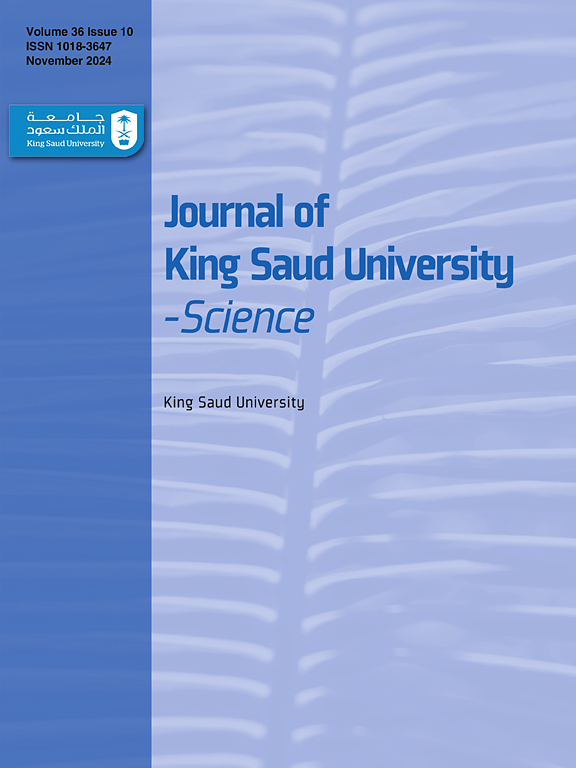有机农业创新:在富含果皮的土壤中栽培小麦草微型灌木并进行抗菌评估
IF 3.6
3区 综合性期刊
Q1 MULTIDISCIPLINARY SCIENCES
引用次数: 0
摘要
目的本研究探讨了富含果皮的土壤作为可持续生长介质的可行性,这种土壤可作为小麦草微型灌木的生物肥料。此外,研究还试图评估果皮(通常被认为是农业废弃物)的抗菌特性,以确定其对植物生长参数的影响。方法收集石榴、橙子和甜酸橙的果皮,将其加工成粉末,然后用水稀释,制成富集土壤。在常规盆栽土壤和富含果皮粉的土壤中栽培小麦草。在 15 天的生长周期内对小麦草的生长参数进行监测,包括发芽率、芽和根的长度以及小麦草的总产量。对选定的果皮进行了抗菌分析,评估它们与对照组(利福平)相比对金黄色葡萄球菌和大肠杆菌的影响。石榴皮对小麦草微绿生长的促进作用尤为明显。此外,抗菌分析表明,与对照组(利福平)相比,石榴皮和甜酸橙皮表现出更优越的特性,对金黄色葡萄球菌和大肠杆菌有明显的抑制作用。其多方面的益处包括促进作物生长和发现天然抗菌剂,特别是石榴皮和甜酸橙皮中的天然抗菌剂。这些发现支持在农业中更广泛地采用具有环境意识的方法,强调了利用农业废弃物促进植物生长和开发合成抗菌剂天然替代品的价值。本文章由计算机程序翻译,如有差异,请以英文原文为准。
Organic farming innovations: Cultivation of wheatgrass microgreens in soil enriched with fruit peels and antimicrobial assessment
Objective
This study explores the viability of fruit peel-enriched soils as a sustainable growth medium, acting as a biofertilizer for wheatgrass microgreens. Additionally, the research seeks to evaluate the antimicrobial properties of fruit peels, typically considered agricultural waste, to determine their influence on plant growth parameters.
Methods
Fruit peels from pomegranate, orange, and sweet lime were collected and processed into powder, and diluted with water to create enriched soil. Wheatgrass microgreens were cultivated in conventional potting soil and soil enriched with fruit peel powder. Growth parameters, including germination rates, shoot and root length, and total yield of wheatgrass microgreens, were monitored over a 15-day growth cycle. Antimicrobial analysis was conducted on selected fruit peels, assessing their impact on Staphylococcus aureus and Escherichia coli compared to a control (Rifampicin).
Results
The results, analyzed through ANOVA and Tukey (post hoc) tests, indicate significant differences among fruit peel-enriched soils. Pomegranate peel emerged as a particularly effective enhancer of wheatgrass microgreen growth. Furthermore, the antimicrobial analysis revealed that pomegranate and sweet lime peels exhibited superior properties, with a notable zone of inhibition effects on Staphylococcus aureus and Escherichia coli compared to the control (Rifampicin).
Conclusion
This study demonstrates the potential of fruit peels as effective biofertilizers to promote wheatgrass microgreen growth in sustainable agricultural practices. The multifaceted benefits include enhanced crop development and the discovery of natural antimicrobial agents, particularly in pomegranate and sweet lime peels. These findings support the broader adoption of environmentally conscious approaches in agriculture, emphasizing the value of utilizing agricultural waste for plant growth promotion and the development of natural alternatives to synthetic antimicrobial agents.
求助全文
通过发布文献求助,成功后即可免费获取论文全文。
去求助
来源期刊

Journal of King Saud University - Science
Multidisciplinary-Multidisciplinary
CiteScore
7.20
自引率
2.60%
发文量
642
审稿时长
49 days
期刊介绍:
Journal of King Saud University – Science is an official refereed publication of King Saud University and the publishing services is provided by Elsevier. It publishes peer-reviewed research articles in the fields of physics, astronomy, mathematics, statistics, chemistry, biochemistry, earth sciences, life and environmental sciences on the basis of scientific originality and interdisciplinary interest. It is devoted primarily to research papers but short communications, reviews and book reviews are also included. The editorial board and associated editors, composed of prominent scientists from around the world, are representative of the disciplines covered by the journal.
 求助内容:
求助内容: 应助结果提醒方式:
应助结果提醒方式:


